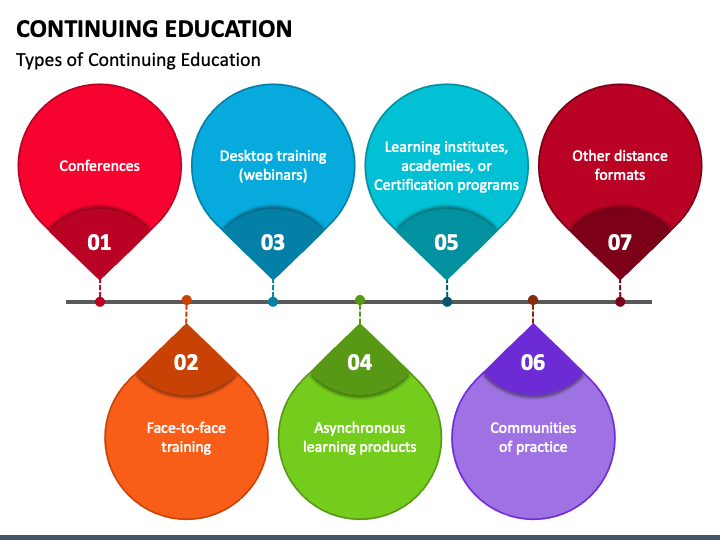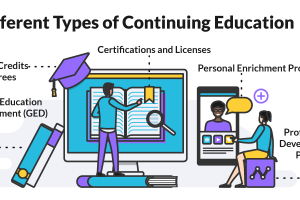In today’s rapidly changing job landscape, workers must engage in lifelong learning to stay competitive. Continuing education expands skills and knowledge outside of degree programs. What options exist for professionals seeking growth?
This article explores the diverse programs and formats of continuing education tailored to career needs.
Professional Certification Programs
Professional certification programs benchmark expertise in specialized fields from project management to healthcare. Certifications are typically administered by professional associations, industry groups, or vendors.
Examples include Six Sigma certifications in quality control, SHRM certifications in human resource management, AWS certifications in cloud computing, and PMP certification for project managers.
Certification programs usually entail an exam assessing mastery of key competencies, principles, tools or technologies. Many require documented professional experience along with passing an exam. Renewing certifications periodically through retesting or continuing education demonstrates ongoing expertise.
According to continuing education expert Laurie Prange, “Professional certifications provide validation of current skills that are valued by employers.” They tangibly communicate capabilities.
Licensure Exam Prep
Many regulated professions like law, healthcare, accounting, and education require licenses to practice. Licensure exams test knowledge of laws, regulations, standards, and abilities for a profession.
Continuing education helps working professionals prepare for licensing exams needed to advance their careers. Offerings include review courses, practice tests, tutoring, and self-study materials tailored to specific exams.
For example, the FINRA Securities Industry Essentials Exam prep helps financial advisors gain licensure. And the TExES exam prep enables teachers to add subject certifications. Supporting licensure boosts opportunities in regulated fields.
Graduate School Test Prep
From the GRE to the LSAT and GMAT, admissions exams weigh heavily in graduate school applications. Prep programs help strengthen test skills through tactics like:
- Content refresher courses in math, verbal, writing, and logic
- Test-taking strategies and timed practice exams
- Personalized tutoring targeting weak areas
- Official practice tests to benchmark progress
According to educational assessment expert Bob Schaeffer, graduate admissions testing is a “high stakes environment where small score differences carry significant consequences.” Quality test prep can give applicants an extra edge.
Professional Development Courses
Short-form professional development courses build in-demand job skills and are offered through:
- Employers – customize training to internal needs
- Colleges/universities – leverage faculty experts for non-credit courses
- Private course providers – develop marketable curriculum
- Conferences/associations – offer specialized sessions
Possible topics run the gamut from data visualization tools to diversity training to social media strategy. Courses range from one session overviews to multi-month formats.
According to continuing education researcher Joe Harder, “Bite-sized professional development efficiently skills up workforces.” Concise learning meets just-in-time needs.
Technical Skills Bootcamps
Bootcamps offer accelerated skills training in areas like cybersecurity, digital marketing, UX design, and coding through intensive courses spanning weeks or months.
The immersive experiences efficiently prepare career changers and help professionals brush up technical abilities. Mentor guidance and hands-on projects replicate real work environments.
Bootcamps produce portfolio-worthy deliverables to demonstrate competencies to employers. Industry group IEEE found 94% of tech bootcamp graduates were employed after completing programs. Bootcamps cultivate in-demand tech skills.
Microcredentials
Digital microcredentials endorse specific skill attainment through bite-sized online courses, assessments, and projects. Learners earn digital badges and certificates verifying capabilities.
Higher education institutions, companies, and online learning platforms like Coursera offer microcredentials spanning both technical and soft skills. The stackable short programs supplement degrees.
“In our rapidly evolving job landscape, microcredentials provide tangible evidence of focused skill building,” notes workforce training expert Shawn Boynes. They offer flexible learning pathways.
Massive Open Online Courses (MOOCs)
MOOCs provide free or low-cost access to online courses from leading universities in topics from photography to Fintech to mindfulness. MOOC platforms include Coursera, edX, Udacity, and LinkedIn Learning.
Self-paced courses feature video lectures, readings, quizzes, peer discussion, and skills development. MOOCs enable affordable, reputable skill building.
A study by Reich and Ruipérez-Valiente found MOOC learners report significant career benefits like getting a raise, starting a business, or changing fields. MOOCs democratize professional development.
Remote or Recorded Conferences
Industry conferences offer invaluable exposure to cutting-edge concepts, best practices, tools, and thought leaders. Now remote access makes conferences more accessible.
Organizations livestream keynotes, sessions, and panels, while offering recorded videos on-demand. Virtual networking and chat tools connect remote attendees. Remote conferences expand professional development access, notes eLearning industry analyst Anita Horsley.
Designing Effective Continuing Education
Quality continuing education follows key best practices:
- Offers flexible, self-paced access accommodating busy professionals
- Curates relevant, practical content that translates to career impact
- Incorporates active learning strategies like discussions, projects, and simulations
- Provides mentor guidance and peer networking opportunities
- Uses assessments, portfolios, and microcredentials to validate learning
- Leverages digital delivery mechanisms for engagement and accessibility
- Aligns content to professional standards, regulations, tools, and emerging practices
- Evaluates learner satisfaction, knowledge gains, and performance outcomes to continually improve
“Well-designed continuing education bridges learning with workplace demands,” explains continuing education scholar Alan Knox. Strategic development strengthens outcomes.
The Future of Continuing Education
Ongoing innovation promises more personalized, convenient continuing education:
- Personalized recommendation engines will suggest relevant programs based on skills, interests, and goals
- Immersive digital experiences like AR/VR will enable simulating professional scenarios from any location
- Artificial intelligence tutors will provide customized coaching and support for self-paced learners
- Smart credentialing platforms will compile verified skills evidence from multiple sources into shareable profiles
- Workplace integration will seamlessly embed learning into workflows and provide it when most relevant
Continuing education must evolve to drive development in an era of agile careers. Organizations like the University Professional and Continuing Education Association (UPCEA) are working to advance and adapt continuing education for tomorrow’s needs.
“Lifelong learning at scale is imperative for an inclusive, prosperous economic future,” says UPCEA president Brad Honious. Continuing education will only grow in importance.

















